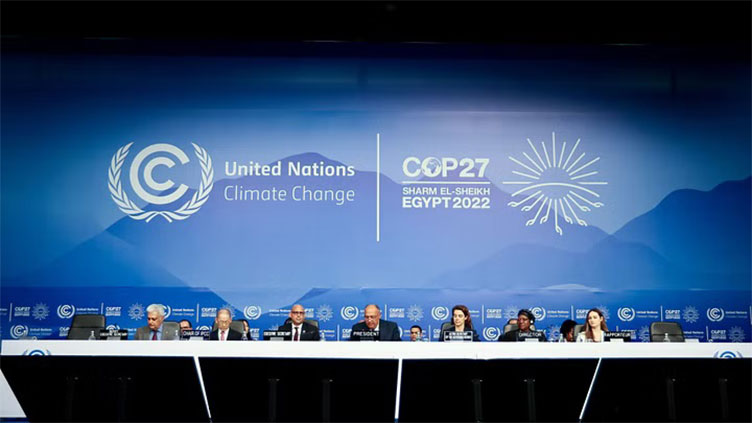Loss and damage added to COP27 agenda, as climate negotiations begin in Egypt

World
Egypt took over the presidency from the UK amid calls for urgent action on climate change.
SHARM EL-SHEIKH (Agencies) - The UN climate change summit COP27 officially opened on Sunday (Nov 6), with negotiations to formally include loss and damage for the first time.
Egypt took over the presidency from the United Kingdom amid calls for urgent action on climate change, implementation of previous climate targets and improved cooperation.
Matters concerning loss and damage - the notion that developed nations responsible for climate change should provide financial assistance to nations suffering the worst impacts - will be included on the agenda.
Delegates approved an item of long-standing contention, related to the “funding arrangements responding to loss and damage associated with the adverse effects of climate change, including a focus on addressing loss and damage".
The vast majority of current climate funding has been directed to mitigation, or efforts to slow down the warming of the planet. More money for adaptation projects will also form key parts of discussion at COP27.
Loss and damage funds would be designed to assist countries suffering from impacts that they cannot avoid or adapt to, and delegates are expected to push for a formal mechanism to deliver those funds.
Newly elected COP president Sameh Shoukry noted that the agenda will not involve liability or compensation, a sticking point for wealthier nations in the past.
“Climate change threatens human life, and the pattern of development in the field of industry must be changed, he said in his address to the summit.
"Egypt is determined to continue the march so that Sharm el-Sheikh is a distinctive landmark on the long path of multilateral effort and collective action to confront the greatest challenge to humanity."
The inclusion of this agenda item will give momentum to nations pushing for more finance to contend with the worsening impacts of climate change, which has further gained urgency in 2022, following disastrous events in Pakistan, Nigeria, Europe, China and the United States.
Alok Sharma, the president of the previous iteration of the summit, held in Glasgow last year, ended his tenure by highlighting the progress made at and since COP26.
That was despite acknowledging that the planet is on track for 1.7 degrees Celsius of warming by the end of the century, missing the target of 1.5 degrees Celsius, seen as a crucial tipping point.
“Every major report published this year underscores the point that progress is being made. Countries and companies are making tangible sectoral progress,” Sharma said in his opening address.
“Despite this progress, I fully recognise the scale of the challenge still in front of us. There is so much more to be done in this critical decade. We are not currently on a pathway that keeps 1.5 in reach.”
“As challenging as our current moment is, inaction is myopic and can only defer climate catastrophe. We must find the ability to focus on more than one thing at once. How many more wake up calls does the world, do world leaders actually need?"
He directed blame at Russian President Vladimir Putin for the “brutal and illegal war in Ukraine” for triggering multiple global crises.
“These crises have compounded existing climate vulnerabilities and the scarring effect of the pandemic,” he said.

